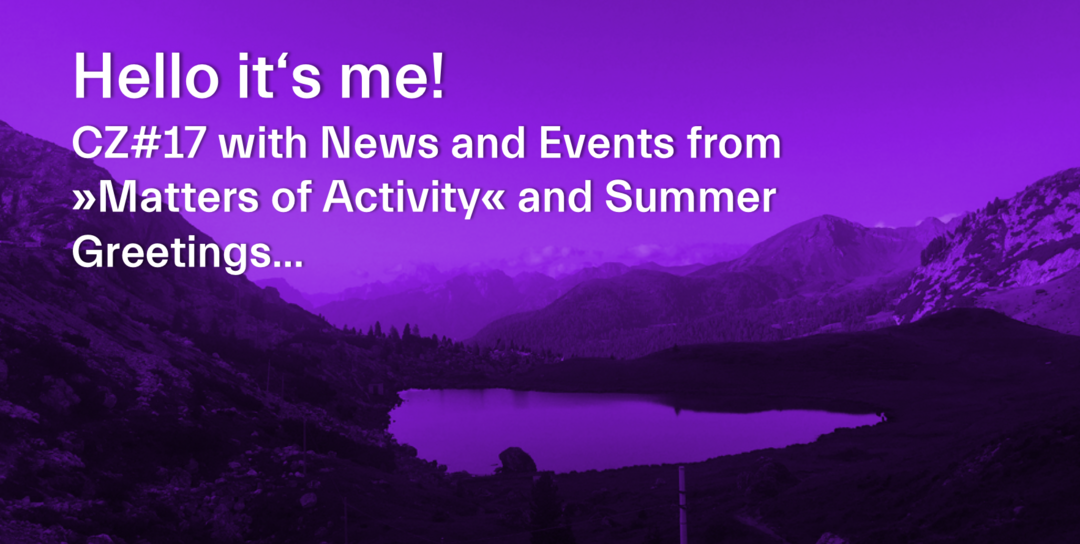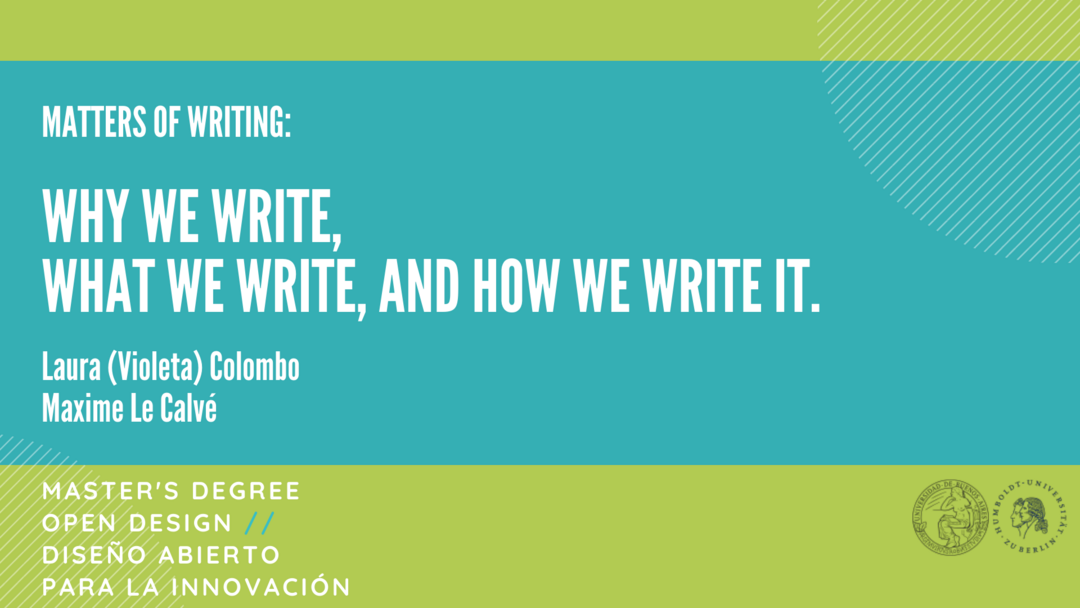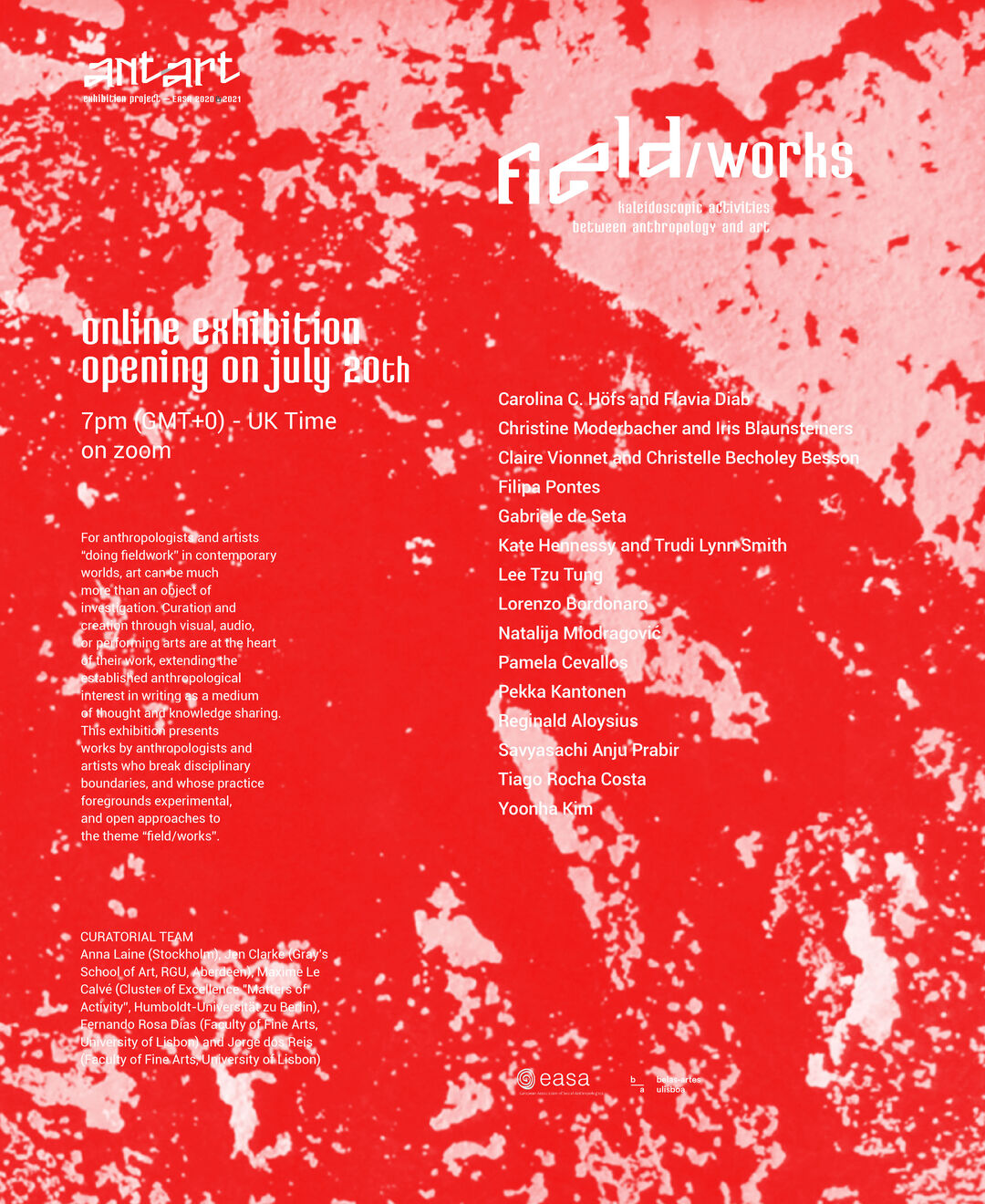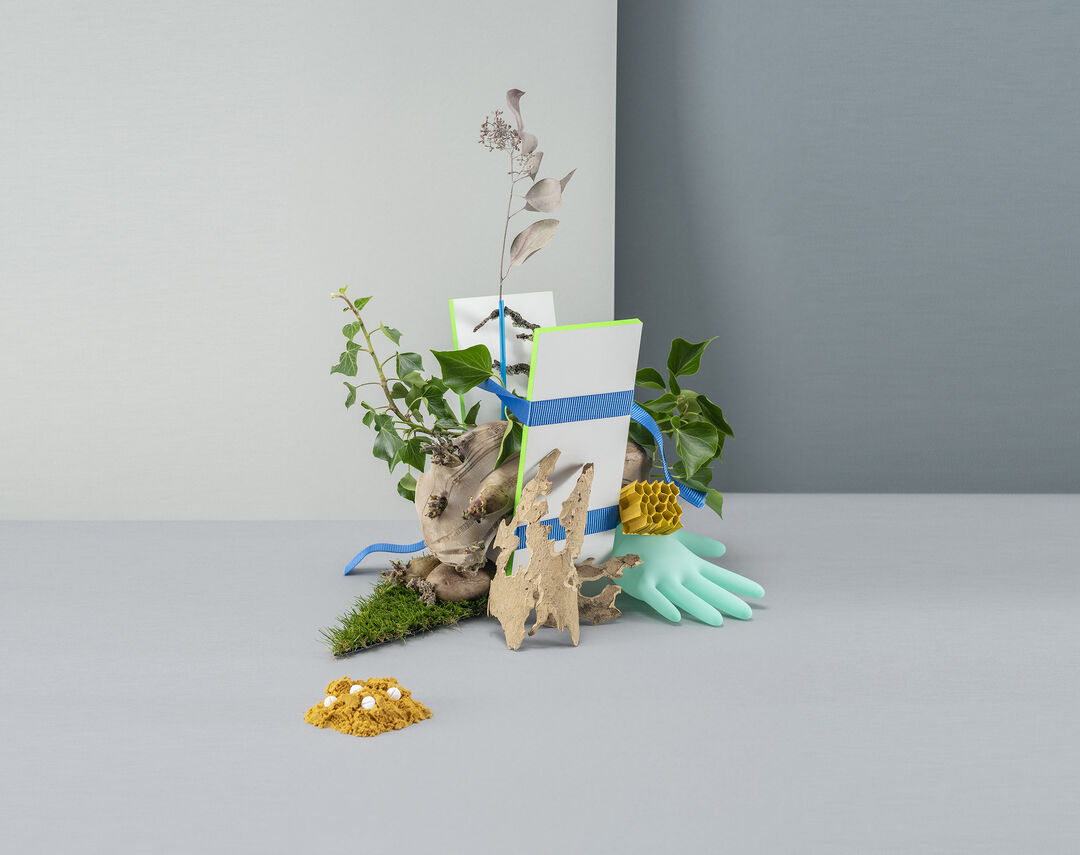|
|
 |
 |
|
|

|
 |
Passo Falzarego, Dolomites, Italy. Copyright: Antje Nestler adapted by »Matters of Activity«
|
|
Editorial Dear friends of »Matters of Activity«,
we hope that the last CZ# before our summer break finds you all well and optimistic. Behind us lies an unusual semester, which was associated with many restrictions, but at the same time showed new possibilities. The absence of personal encounters was not easy for the research and project work, and the sight of the empty Clusterrooms has often been sad. Many exciting and long-planned events had to be canceled.
Nevertheless, digital communication worked extremely well, ensuring continuity and surprising formats and content.
Certainly these were challenging months for all, albeit in different ways. All the more reason to hope that this summer will bring many relaxing moments for you – maybe you even enjoy it without long travels staying closer to home and its lake-rich surroundings.
Before that, we would like to provide you with the most important information about the Cluster and its partners. For example we are excited to announce that the Veterinary Anatomy Theater (TA T) is now accessable virtually in 360°. Get a behind the scenes look of the exhibtion space and enter the secret life of things. Or find out more about the exhibitions »Field/Works. Kaleidoscopic Activities between Anthropology and Art« and »Macht Natur« at State Studio.
Stay healty and take care
Antje Nestler, Eva Schmidt and Franziska Wegener
|
 |
|
Liebe Freund*innen von »Matters of Activity«,
wir stehen kurz vor der Sommerpause des Clusters. Hinter uns liegt ein ungewöhnliches Semester, das mit vielen Einschränkungen verbunden war, zugleich aber auch neue Möglichkeiten aufgezeigt hat.
Der Verzicht auf persönliche Begegnungen war für die Forschungs- und Projektarbeit nicht einfach, die leeren Räume des Clusters immer wieder auch ein trauriges Bild. Viele spannende und von langer Hand geplante Veranstaltungen mussten abgesagt werden.
Nichtsdestotrotz klappte die digitale Verständigung erstaunlich reibungslos und sorgte für Kontinuitäten, überraschende Formate und Inhalte.
Sicher ist, dass es für alle, wenn auch auf unterschiedliche Art und Weisen, fordernde Monate waren. Umso mehr hoffen wir, dass der Sommer viele erholsame Momente bringt. Vielleicht genießt ihr sie etwas näher der Heimat als üblich, sogar in Berlin oder in seiner schönen seenreichen Umgebung.
Davor möchten wir euch in der CZ# noch einmal mit den wichtigsten Informationen rund um den Cluster versorgen. Beispielsweise freuen wir uns sehr darüber, dass das Tieranatomische Theater (TA T) nun virtuell in 360° zugänglich ist. Werft einen Blick hinter die Kulissen des Ausstellungsraums und tretet ein in das geheime Leben der Dinge oder infomiert euch über die Ausstellungen »Field/Works. Kaleidoscopic Activities between Anthropology and Art« und »Macht Natur« im State Studio.
Bleibt gesund und munter
Antje Nestler, Eva Schmidt und Franziska Wegener
|
 |
|
|
|
|
 |
| Matters of Writing |
| 3rd Open Design – Academic Encounters Online |
 |
|
|

|
 |
Matters of Writing. Copyright: Matters of Activity
|
|
Master Open Design Do you see yourself as an author? This question was asked by Laura (Violeta) Colombo, lecturer in the Master's Degree in Open Design at the Universidad de Buenos Aires during the third meeting of »Open Design - Academic Encounters Online«.
A short silence, heads shaking, followed by shy hand signals. Why do we find it difficult to consider and also identify ourselves as authors? What makes for good writing? Why do we write, what do we write and how do we write it? These were some of the key questions of this week’s online encounter held by → Maxime Le Calvé, Research Associate at Matters of Activity in collaboration with Laura (Violeta) Colombo, Research Assistant at CONICET (National Council for Scientific and Technological Research of Argentina).
The texts we read are the result of a lot of pre-writing and intermediate writing phases and activities, but such underlying writing routines and collaborations of good writing often remain hidden. How can our different backgrounds, educational and professional paths enrich our writing practice? Genres, drafts, the concept of text, themes, methods and technologies, continuity and creativity are all aspects of the individual and collective writing process taught in the international and interdisciplinary Master’s program »Open Design«. ↗ more
|
 |
|
|
|
|
 |
| Field/Works. Kaleidoscopic Activities Between Anthropology and Art |
| Exhibition Opens Including Works of Cluster Members |
 |
|
|

|
 |
Poster »Field/Works«. Copyright: Antart
|
|
Event | Exhibition The exhibition »Field/Works. Kaleidoscopic Activities between Anthropology and Art« opens at July 20th, 7:00pm, with a guided tour, special guests, and discussions with virtual drinks. The exhibition presents works by anthropologists and artists who break disciplinary boundaries, and whose practice foregrounds experimental, and open approaches to the theme ›field/works‹. It extends the established anthropological interest in writing as a medium of thought and knowledge sharing, and engages with curation and creation through visual, audio, and performing arts. The Cluster members → Natalija Miodragovic and → Yoonha Kim are presenting their work at the event.
The exhibition is organized by the ↗ ANTART (Anthropology and the Arts) network in collaboration with the FBAUL (Faculty of Fine Art) at Lisbon University. The opening is a public event available via Zoom. Please contact co-curator and Cluster member → Maxime Le Calvé, if you are interested.
|
 |
|
|
|
|
 |
| »Macht Natur« |
| What Power do We Exert on Nature? And How Much Power Does Nature Have Over Us? |
 |
|
|

|
 |
»Macht Natur« at State Studio. Copyright: Samuel Henne
|
|
Event | Exhibition As a rule, today we generally refer to nature as something that has not been created by humans. By now we do have an impact on the entire planet. The boundaries between nature and technology are blurring and our ideas, lifestyles and values are changing. Challenges such as climate change, species extinction and the provision of resources for a growing world population require new solutions and approaches.
The exhibition »Macht Natur« at State Studio presents results from three years of research and invites you on a journey through familiar and unknown terrain from August 13th to September 10th. You are invited to join the exhibition opening on August 13th, 6:30pm at ↗ State Studio in Berlin. As part of the three-year research project »Farming the Uncanny Valley« »Macht Natur« now shows the results of nine workshops in 2019 with five subjects.
The exhibition presents innovations, potentials and risks of bio-economy in the fields of insects, plants, soil and air, offering you the opportunity to try out different perspectives and deal with new phenomena in a playful way. How far do we want to go and where do we draw boundaries?
›Air‹ will be investigated by design researcher and Cluster member → Clemens Winkler. ↗ more
|
 |
|
|
|
|
 |
| Soft Systems – Special Issue of Journal of Textile Design Research and Practice |
| Call for Full Papers Closes 1 September 2020 |
 |
|
Call This special issue probes the practice of textiles and material-led researchers from both methodological and applied definitions of »Soft Systems«. Designers are working with hermeneutic approaches synonymous with the fields of both traditional and innovative textiles and fashion to expose anomalies in perceived circumstances and create affective encounters to explore them. They work from the speculative and applied, for the now and far future. Explorations and integrations of technological, scientific, design and craft processes within textile and material-led systems avoid ontological permanence moving away from preconceived understandings of textiles, fabric or cloth to examples of radical ›textilic‹ practice.
They invite contributions from a diverse range of practitioners and scholars who explore complex systems by privileging and asserting materials and making in their creative and critical methodologies and practices. The Call for full papers closes September 1st.
Please find more information ↗ here.
|
 |
|
|
|
|
 |
| Competition of Ideas: Biologization of Technology |
| Announcement of the Federal Ministry for Education and Research (BMBF) |
 |
|
Call The ideas competition is intended to take a first step towards making use of the knowledge available in Germany with regard to technical feasibility and its implementation in industrial applications in the two key technologies »New Materials« and »Production Research« (here: product development and production processes). Under this call, research and development work will be funded with the aim of increasing the application and exploitation chances of biologically inspired materials, tools, methods or procedures in the field of Materials Sciences and Materials Research or Production Research. Project outlines must be submitted in German by September 20th, 2020.
For more information take a look at the pages of ↗ Acatech or the ↗ Federal Ministry (only available in German).
|
 |
|
Mit dem Ideenwettbewerb »Biologisierung der Technik« soll ein erster Schritt unternommen werden, das in Deutschland verfügbare Wissen im Hinblick auf die technische Machbarkeit und die Umsetzung in industriellen Nutzen, in den beiden Schlüsseltechnologien »Neue Werkstoffe und Materialien« und »Produktionsforschung« (hier: Produktentstehung und Produktionsprozesse) zur Geltung zu bringen. Im Rahmen der Ausschreibung werden Forschungs- und Entwicklungsarbeiten mit der Zielsetzung gefördert, die Anwendungs- und Verwertungschancen von biologisch inspirierten Materialien, Werkzeugen, Methoden oder Vorgehensweisen im Bereich der Materialwissenschaft und Werkstoffforschung oder Produktionsforschung zu erhöhen. Projektskizzen sind in deutscher Sprache bis zum 20. September 2020 einzureichen.
Weitere Informationen finden Sie auf den Seiten der ↗ Acatech oder des ↗ Forschungsministeriums.
|
 |
|
|
|
|
 |
| Henriette Herz Scouting Program |
 |
|
Call With its Henriette Herz Scouting Program, the Alexander von Humboldt Foundation invites internationally networked academics to apply as scouts and, if their selection is successful, to award up to three Humboldt Research Fellowships to junior researchers (postdocs) from abroad.
The Henriette Herz Scouting Program addresses researchers at different career stages in all disciplines in Germany.
Please find all information about the ↗ procedure and ↗ criteria here.
|
 |
|
|
|
|